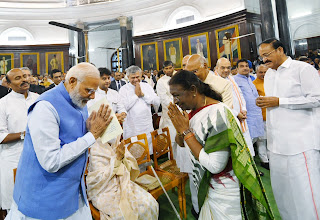Draupadi Murmu was sworn in as the 15th President of the Republic of India on July 25, 2022. She is the First Tribal and the Second Woman President of India. She is also the First President born in independent India.
"For the first time after independence, a woman from a
Tribal community that too among the most backward of tribes, Santhal (third
largest tribe in India after, Gonds and Bhils), became the country’s First
Citizen. It is a very big victory for the Democracy,” Union Home Minister Amit
Shah said.
Droupadi Murmu is an Indian politician serving as the 15th
and current President of India. She is a member of the Bharatiya Janata
Party (BJP). She is the first person belonging to the
indigenous, Scheduled Tribe (ST) community to be elected as
the President of India. Prior to her presidency, she served as the
ninth Governor of Jharkhand between 2015 and 2021. She also held
various portfolios in the cabinet of Government of Odisha, between 2000 to
2004.
Before entering politics, she worked as a clerk in the State
Irrigation and Power Department, Government of Odisha, from 1979 to 1983, and
then worked as a teacher in Rairangpur till 1997.
Droupadi Murmu joined the Bharatiya Janata
Party (BJP) in Rairangpur. She was elected as the councilor of
the Rairangpur Nagar Panchayat in 1997.
She won the Odisha Legislative Assembly election 2000
from Rairangpur Assembly constituency and served for two terms in
the Odisha Legislative Assembly between 2000 and 2009. During the BJP
and BJD coalition government in Odisha, she was the Minister of
State with Independent Charge for Commerce and Transportation from March,
2000 to August 2002, and Fisheries and Animal Resources Development from August
2002 to May 2004. In 2009, she lost the Lok Sabha
election from Mayurbhanj Lok Sabha constituency as the BJD and
BJP alliance had ended.
About President
President of Republic of India is head of all Indian states
and first citizen of India. President of India is elected by Electoral College
consisting of MPs of both houses of Parliament and MLAs of all states including
Delhi & Puducherry. Nominated MPs, and MLAs are not allowed to cast vote in
President's election.
Under the draft constitution the President occupies the same
position as the King under the English Constitution. He is the head of the
state but not of the Executive. He represents the Nation but does not rule the
Nation. He is the symbol of the Nation. His place in the administration is that
of a ceremonial device on a seal by which the nation's decisions are made
known.
— Bhimrao Ambedkar, chairperson of the drafting committee of
the Constituent Assembly of India.
Power of President
The President of India is the head of
state of the Republic of India. The President is the formal head of
the Executive, Legislature and Judiciary of India and is
also the Commander-in-Chief of the Indian Armed Forces. The
primary duty of the president is to preserve, protect and defend the
constitution and the law of India.
Military Power
President is Commander-in-Chief of all Indian armed forces.
President can declare war on a country or conclude peace with any country on
the advice of council headed by Prime Minister.
Appointing Power
President of India has power to appoint Prime Minister, Chief
Justice of India, other judges of Supreme Court, Chief of Army, Navy and Air
force, Governor of state, attorney general, ambassador to other countries etc.
Emergency Power
President can declare three types of emergencies:
a)
National
emergency
b)
State
emergency
c)
Financial
emergency
Legislative Power
President of India has power to dissolve the Lok Sabha.
President gives final assent to pass a bill. After passing the bill from both
the houses of the Parliament, the bill comes for the assent of the President.
Now, it is president's choice to pass or reject the bill. President can
promulgate ordinance in the absence of parliament session and President can
summon both houses of parliament to meet jointly.
Judicial Power
It is the power of the president of India to grant pardon
reprieves, respites, and remission of punishment. She/he can suspend remit or
commute the sentence of any person convicted of any offence.
Some Important Articles of Constitution related to President
ARTICLE 52: THE PRESIDENT OF INDIA.
ARTICLE 53: EXECUTIVE POWER OF THE UNION.
ARTICLE 54: ELECTION OF PRESIDENT.
ARTICLE 55: MANNER OF ELECTION OF PRESIDENT.
ARTICLE 56: TERM OF OFFICE OF PRESIDENT.
ARTICLE 57: ELIGIBILITY FOR RE-ELECTION.
ARTICLE 58: QUALIFICATIONS FOR ELECTION AS PRESIDENT.
ARTICLE 59: CONDITIONS OF PRESIDENT’S OFFICE.
ARTICLE 60: OATH OR AFFIRMATION BY THE PRESIDENT.
ARTICLE 61: PROCEDURE FOR IMPEACHMENT OF THE PRESIDENT.
ARTICLE 62: TIME OF HOLDING ELECTION TO FILL VACANCY IN THE
OFFICE OF PRESIDENT.
ARTICLE 72: POWER OF PRESIDENT TO GRANT PARDON.
ARTICLE 74: COUNCIL OF MINISTERS TO ADVICE PRESIDENT.
ARTICLE 85: SESSION OF PARLIAMENT DISSOLUTION.
ARTICLE 111: ASSENT TO BILL.
ARTICLE 123: POWER TO PROMULGATE ORDINANCE.
ARTICLE 143: POWER TO CONSULT TO SUPREME COURT.
FORMER PRESIDENTS
Shri Ram Nath Kovind (25 July, 2017 to 25 July, 2022)
Shri Pranab Mukherjee (25 July, 2012 to 25 July, 2017)
Smt Pratibha Devisingh Patil (25 July, 2007 to 25 July, 2012)
Dr. A.P.J. Abdul Kalam (25 July, 2002 to 25 July, 2007)
Shri K. R. Narayanan (25 July, 1997 to 25 July, 2002)
Dr. Shankar Dayal Sharma (25 July, 1992 to 25
July, 1997)
Shri R Venkataraman (25 July, 1987 to 25 July, 1992)
Giani Zail Singh (25 July, 1982 to 25 July, 1987)
Shri Neelam Sanjiva Reddy (25 July, 1977 to 25 July, 1982)
Dr. Fakhruddin Ali Ahmed (24 August, 1974 to 11 February,
1977)
Shri Varahagiri Venkata Giri (3 May, 1969 to 20 July, 1969
and 24 August, 1969 to 24
August, 1974)
Dr. Zakir Husain (13 May, 1967 to 3 May, 1969)
Dr. Sarvepalli Radhakrishnan (13 May, 1962 to 13 May, 1967)
Dr. Rajendra Prasad (26 January, 1950 to 13 May,
1962)

Blogger Comment
Facebook Comment